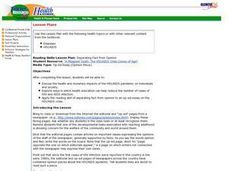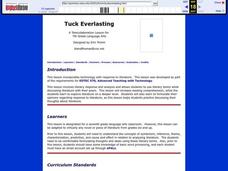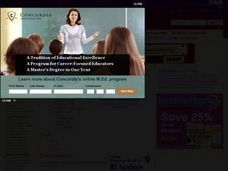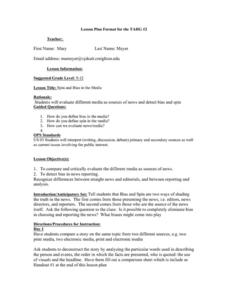Curated OER
Separating Fact from Opinion
Students read, "A Misspent youth: The HIV/AIDS Crisis Comes of Age", and discuss the article or write their answers to the questions imbedded in the lesson. They write their own essay.
Curated OER
Tuck Everlasting
Seventh graders use literary terms while discussing literature with their peers. They explore literature on a deeper level. Students formulate their opinions regarding response to literature, as this lesson helps students practice...
Curated OER
Students as Historians: Investigating the Gulf War
Sixth graders investigate the Gulf War using primary and secondary sources. Students research using a variety of sources including the internet.
Facing History and Ourselves
Verifying Breaking News
The attempts of journalists to verify the events surrounding the shooting of Michael Brown take center stage as individuals analyze three of the initial newspaper accounts of the story. The whole class discussion then focuses on the...
Curated OER
I Am Not a Crook
Students use video, Internet research and discussion to consider the presidency of Richard Nixon. They obtain information from multiple perspectives and form an opinion of how Richard Nixon should be remembered.
Curated OER
Your Right to an Attorney
An outstanding lesson plan on a person's right to have attorney's representation in a court case is here for your young learners of the law. Pupils read a lengthy account that spells out the laws regarding legal representation, then...
PBS
Does Art Imitate Life?
Write what you know, sound advice for any writer and something many famous authors are known to have done. Use these materials to explore how Shakespeare's life influenced his plays. This resource is packed with readings, video segments,...
Curated OER
Children's Media and Censorship
High schoolers form opinions about children and television censorship after analyzing literature. They complete a journal writing activity to identify the topic and make a list of inappropriate television shows for children. Next, they...
iCivics
Yeah, But...
Impress upon your young learners the importance of formulating counter arguments based on facts and not opinions. This resource is meant to strengthen arguments designed in a previous lesson, but could also be used as a stand-alone...
Curated OER
Why Do I Want All This Stuff?
Students identify two factors that determine consumer demand as well as substitutes and complements for selected goods and services. After examining advertisements, they distinguish between fact and opinion and explore the factors that...
Curated OER
The Diary of Col. William Fairfax Gray
Fourth graders examine facts and opinions given by William Fairfax Gray in his diary, compare and contrast ideas expressed in his diary, express opinions using correct language arts skills, and calculate answers to given mathematical...
Curated OER
The Vaccination Question
Young scholars share opinions about common vaccines, then consider facts and opinions about the HPV vaccine and hold a fishbowl and discussion. They survey members of the community to determine their perspectives on the issue.
Curated OER
Osage, Legend, and Arkansas History
Elementary schoolers evaluate the legend of Norristown Mountain by looking at facts about the Osage Indians and the legend itself. They do an exploration of Arkansas' Native American groups which includes a look at their legends,...
Curated OER
What's In the Shopping Bag?
Students explore the techniques used by advertisers to sell toys and snack foods, increase awareness of consumer habits and media influences and differentiate between information and selling.
Curated OER
The Atomic Bomb Dilemma
Students examine consequences of using atomic bomb in light of resulting peace, distinguish between fact and opinion and analyze sources to recognize bias and points of view, and assume role of reporter, critic, cabinet member, or...
Curated OER
Up, Up, and Away
Middle schoolers research hot-ballooning using Internet resources including an around-the-world balloon flight. They determine fact from opinion, examine point of view, and determine main idea, and details. They write a journal entry...
Curated OER
Getting to Know the Candidates: Analyzing Their Campaign Ads
Pupils examine the role of advertising in presidential campaigns. They analyze one candidate's advertising campaign ads for elements such as major issues, positivity, negativity, facts, and opinions.
Curated OER
Conducting Research
Third graders conduct research. In this conducting research instructional activity, 3rd graders discuss the importance of nonfiction text in providing factual information. Students write questions about an assigned topic and research...
Museum of Tolerance
Developing Media Literacy
To protect young people from questionable content, many schools limit access. This resource suggests that because learners can so readily avail themselves to unrestricted Internet access, it is vital for 21st century learners to develop...
Facing History and Ourselves
Free Press Makes Democracy Work
A unit study of the importance of a free press in a democracy begins with class members listening to a podcast featuring two journalists, one from a United States public radio station and one from Capetown, South Africa. The lesson plan,...
Curated OER
Spin and Bias in the Media
High schoolers compare different types of media. In this media comparison lesson, students will assess the where all types of media gets its information by viewing a video of a news story and critiquing it.
Curated OER
Observation
Students study the different kinds of observation: fact and opinion. For this observation lesson students complete an activity that allows them to use their senses to make observations.
Curated OER
HOT TOPICS OF THE MISSISSIPPI
Students use a five-step process to write a persuasive essay about an issue that is related to the Mississippi River. Students build an argument based on prior knowledge and information from a variety of sources. Students base their...
Pennsylvania Department of Education
Stories? Information? What's the Difference?
Students listen to a power point presentation to distinguish between fiction and nonfiction text. In this what's the difference lesson, students identify fact from opinion within a text. Students listen critically and respond to text.
Other popular searches
- Fact Opinion Lesson Plans
- Fact and Opinion Passages
- Fact Opinion Worksheet
- Fact and Opinion Lessons
- Teaching Fact vs. Opinion
- Fact and Opinion Worksheets
- Teaching Fact and Opinion
- Fact and Opinion Games
- Reading Fact and Opinion
- Fact and Opinion Keywords
- Identifying Fact or Opinion
- Fact Opinion Quiz

























